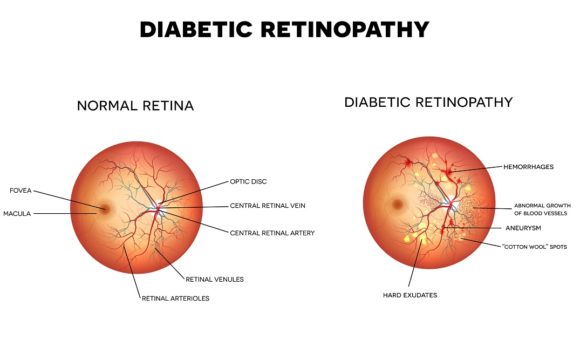Diabetic Retinopathy is an eye disease that can affect those suffering from diabetes. It causes damage to the blood vessels located within the retina
The result of Diabetic Retinopathy is often irregular blood vessels that can get swollen and leak or restrict blood from flowing through them. The damaged vessels are then sometimes replaced by new, abnormal blood vessels that also do not function properly. In severe cases this can lead to blindness.
How Does Diabetes Lead to Diabetic Retinopathy?
Diabetic Retinopathy is caused by excess blood sugar flowing through the blood vessels in the retina. Because the level of blood sugar is greater than what the blood vessels were designed for, this causes significant damage within the vessels.
Many people with diabetes suffer from Diabetic Retinopathy to some extent. As the disease progresses, so does the level of damage experienced by the patient.
Early Diabetic Retinopathy
Early on, the smallest of the blood vessels in the retina begin to bulge until they leak into the retina. Even in the early stages of Diabetic Retinopathy, the symptoms can become severe. The central area of the retina can begin to swell, known as macular edema. Once the patient’s retinas get to this point treatment is usually required.
Advanced Diabetic Retinopathy
The more advanced and severe stage of Diabetic Retinopathy is commonly referred to as Proliferative Diabetic Retinopathy. This is caused when the retinal blood vessels close off completely. The body responds to the loss of blood vessels by creating new abnormal vessels. The abnormal growth of new blood vessels causes more swelling and leakage of blood filling the center of the eye.
This is followed by scar tissue which, in severe cases, can cause the retina to detach. The blood vessels and scar tissue can cause a loss of flow out of the eye can lead to severe glaucoma.
Is There Anything That I Can Do to Prevent the Causes of Diabetic Retinopathy?
It is possible for a patient suffering from Diabetes to mitigate the causes of Diabetic Retinopathy. Managing your Diabetes can help keep your blood sugar levels in check. Following your primary care doctor’s recommendations can help you achieve healthier blood sugar levels.
Because high levels of blood sugar leads to Diabetic Retinopathy, it is extremely important to monitor your blood sugar consistently. The higher your blood sugar levels, the higher your risk for the disease.
Knowing that you have Diabetes, you need at least annual dilated eye examinations which can pick up problems that can be treated prior to developing any visual loss. Undilated exams are not sufficient and even “special tests” or “special photographs” do not take the place of a thorough dilated eye examination. You also have to be conscious of any changes that you may have in your vision. If you experience any issues with your sight such as blurry or hazy vision or new floaters it is important for you to be examined by an eye specialist right away.
If diagnosed early enough, it is still possible to make lifestyle and health changes to limit further damage. Early treatment leads to better visual outcomes. If you have any questions or concerns regarding Diabetic Retinopathy, call the Fort Lauderdale Eye Institute or Fort Lauderdale Retina Institute today to schedule an appointment with one of our fellowship trained retina specialists.

